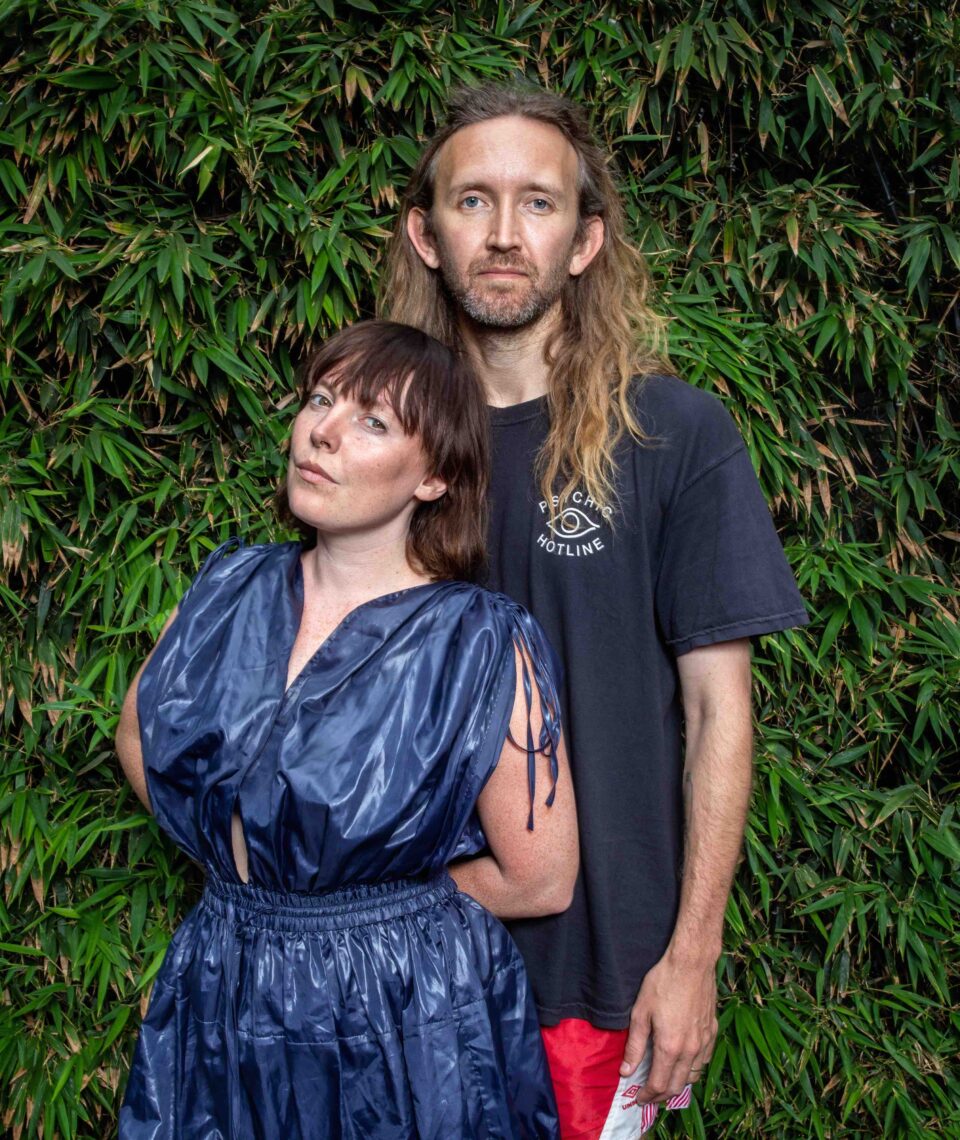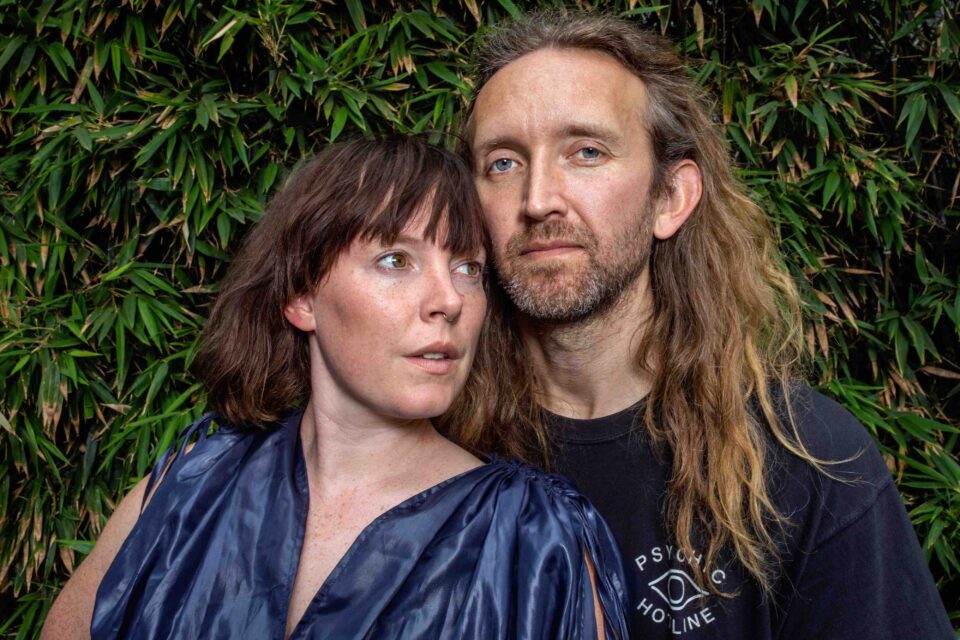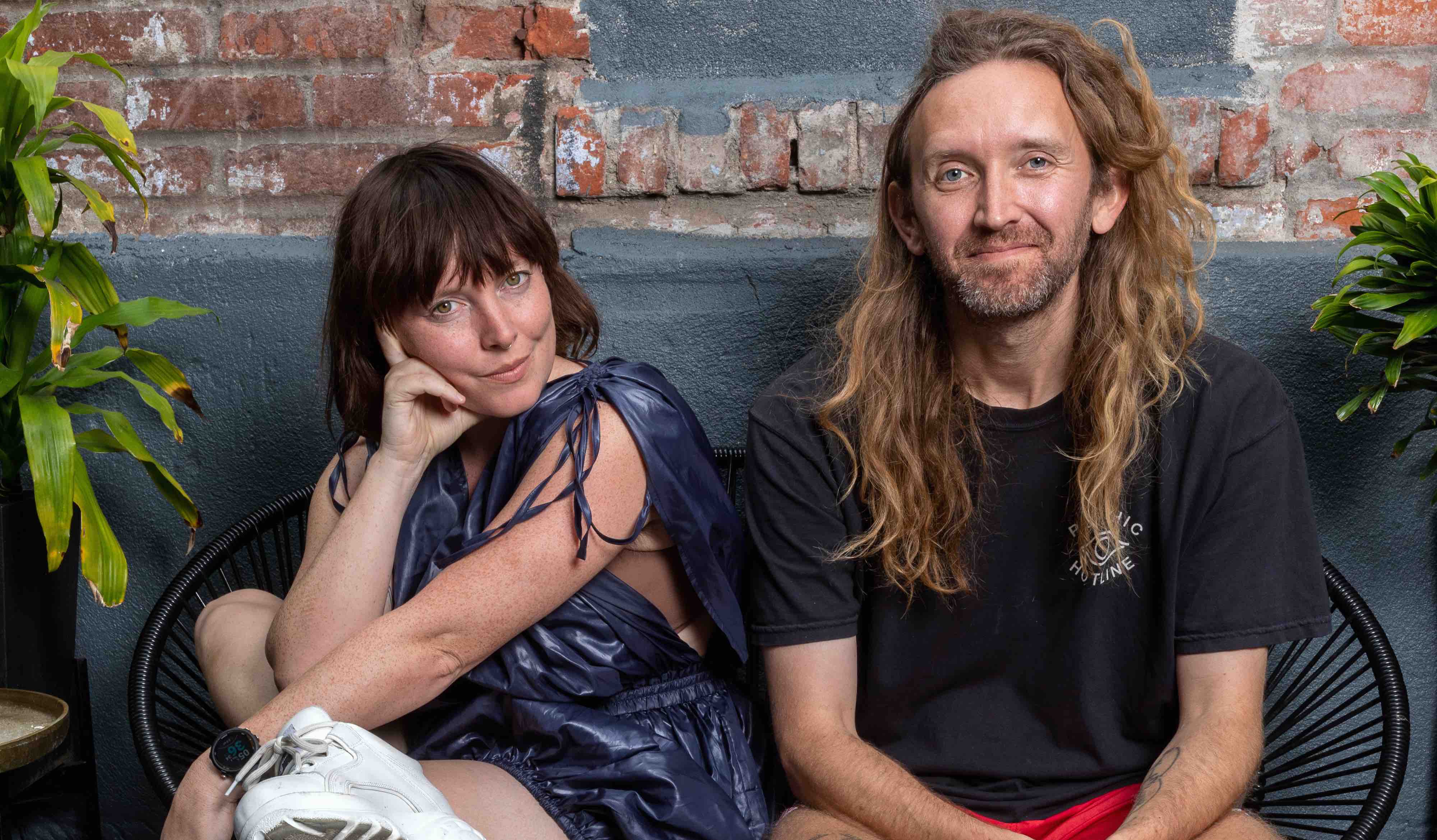Sylvan Esso’s new album began life with a road trip. It was the same cross-country journey that Amelia Meath and her husband and bandmate Nick Sanborn try to take every year, loading up the Prius with recording gear and instruments on New Year’s Day and heading west from Durham, North Carolina, to Los Angeles.
The plan wasn’t to make an album, but to meet up with friends and potential collaborators, to socialize and have fun now that the coronavirus was finally over. Except that it wasn’t, and the Omicron variant of COVID-19 was about to land with a major spike. By the time they got to LA, the world had retreated back indoors. Even the GRAMMYs—where they were nominees and presenters—got pushed back to April. It was the best thing that could have happened. “We were just free birds,” says Meath of the unexpected time to write and record far from home in LA’s Echo Park neighborhood. “Everything got cancelled. And then we just wrote. Every morning we'd wake up and try to write a song.”
Despite the lack of a soundproof environment, where the sounds of dogs, birds, and leaf-blowers outside could be picked up, an unexpected collection of songs emerged from the sessions: No Rules Sandy. It was the fastest recording of Sylvan Esso’s career, and the next evolution in the band’s compositions of warm, smart, and playful electronics. It also marked a reprieve after the music industry’s long season of coronavirus ups and downs. “The more we just went with our gut on everything,” says Sanborn, “the more it reflected how we had been feeling for the last year and a half.”
“The more we just went with our gut on everything, the more it reflected how we had been feeling for the last year and a half.”
— Nick Sanborn
Several months after those sessions, Meath and Sanborn are relaxing in the summer heat over cool drinks on the rooftop patio of a favorite hotel in LA’s Koreatown. The city’s a frequent destination for Sylvan Esso, and tonight they’re set to DJ at a local club, Gold-Diggers, and plan to share the new album with fans during that set. The new songs are all anxious beats and electronic sound, with vocals relaxed and floating. It's a collision of different energies that could easily go off the rails but never does. “In the moment it kind of felt like COVID was never going to end, and I think you can really hear that,” Meath says of the Echo Park sessions. “Who knows what horrible shit-storm will be thrown at us next. The killer bees have yet to show up.”
The album title is just as it might have first been uttered by Meath, who often refers to her husband affectionately by the nickname Sandy. It’s also a line from the song “Your Reality,” signifying how the band’s standard operating procedure was tossed out just as quickly as their original travel plans. Songs were typically written in about 20 minutes, Meath says, as they worked from noon to 4 p.m. around a couple of tables and a microphone, focusing on one track a day. “There was an excellent chaise lounge that had cow prints on it that I recorded and wrote most of the lyrics for this record on,” she adds. “Sometimes I was lying down. It was very nice.”

They wrote the bright and danceable “Sunburn” on the first day, and it felt like a single, and something they might have written a year or two before. But then came the stuttering, anxious “Moving,” and Meath recognized it as the first sign that a new album—and a shift in direction—was happening. If their first albums were a mingling of the organic and forward-leaning electronic, now the digital side was taking the lead. The final track, “Coming Back to You,” begins as Sylvan Esso at their most organic, built upon gentle acoustic guitar and Meath’s hopeful, vulnerable vocal. And she’s singing about another road trip: “I’m on a ribbon of concrete / I am a blurred shot, a bright streak / Coming back to you.”
“We’re going deeper—truer or more vulnerable. That’s where the good shit is.”
— Amelia Meath
At points, her voice is given a robotic accent of frayed electronics that somehow only makes the feeling more human rather than less so. Which is a magic formula they discovered for themselves, using vintage drum machines, samplers, MIDI, and Moog gadgets to tap genuine emotion, as lyrics grew increasingly personal for Meath. “We’re going deeper—truer or more vulnerable. That's where the good shit is,” she notes.
That was especially true on “How Did You Know,” which Meath wrote as a conversation with herself about self-care, both physical and emotional. The words tumbled out of her quickly, and were recorded to the track’s urgent beats and breathless melody: “My friend / With me all the time / In the mirror every night / Saying, ‘How, how did you know?’” Sanborn of course applauded the lyrics the moment he heard them. “She wrote this thing and I was instantly in love,” he says with a smile. “It was just so honest. I had never heard her sing like that. And she was very much like, ‘Well, don’t get married to those lyrics, I’m changing all that.’”

Meath soon came up with an entirely different version of the song, with lyrics describing a romantic scene in a diner. She was happy with those, but when they listened back to both versions side by side she reluctantly agreed the original was best. “When you write a song, you're basically dipping into your own consciousness, and it's as if you're in a relationship,” she explains. “There's a level of self-observation that's just very intimate.”
With most of the work done, Sylvan Esso brought the recordings back to their studio in the woods outside Durham for some final touches. At their own studio, Betty’s, and with their own indie record label, Psychic Hotline, they’re on a mission to build a larger community of like-minded artists. “Our studio at home,” says Sanborn, “is in the middle of the woods and it's very serene.”
“We’ve been an indie band for so long, and we’ve somehow muscled our way into so many places that, by all accounts, we shouldn’t necessarily be. Somehow we managed to get taken seriously, which is something that we had a chip on our shoulder about for so long.”
— Amelia Meath
Even as No Rules Sandy represents the couple breaking rules and stretching beyond their previous pop song elements, Sylvan Esso has been embraced and celebrated by the larger culture far beyond the usual indie act. Early on, there was a gig on The Tonight Show, then the morning chat shows, a feature in Vanity Fair. They were even presenters at the pre-broadcast GRAMMYs this year. “We've been an indie band for so long, and we've somehow muscled our way into so many places that, by all accounts, we shouldn't necessarily be,” says Meath. “We had floor seats at the GRAMMYs and we're watching these incredible performances being like, ‘That’s what we do.’ Somehow we managed to get taken seriously, which is something that we had a chip on our shoulder about for so long. I wouldn't give it up for anything. It's so silly and strange.”
In her mind, she sees No Rules Sandy as the first chapter in something new. When the band started, she says, it was designed to be an art project with pop elements, but was immediately successful. If they drifted a bit from that initial idea, they’re back now on their original course. “We're never going to sound like polished pop music—because it's not the thing that 100 percent excites us, but also because we're too strange,” Meath adds cheerfully. “With this one, it's a return in a lot of ways. We're back to just making shit, trying to impress each other. We’re giving ourselves permission to do things that feel a little strange or exciting in a different way.” FL

The band Sylvan Esso — Amelia Meath (left) and Nick Sanborn — in Los Angeles. The married indie rock/electro-pop duo were about to release a new album, “No Rules Sandy.”







